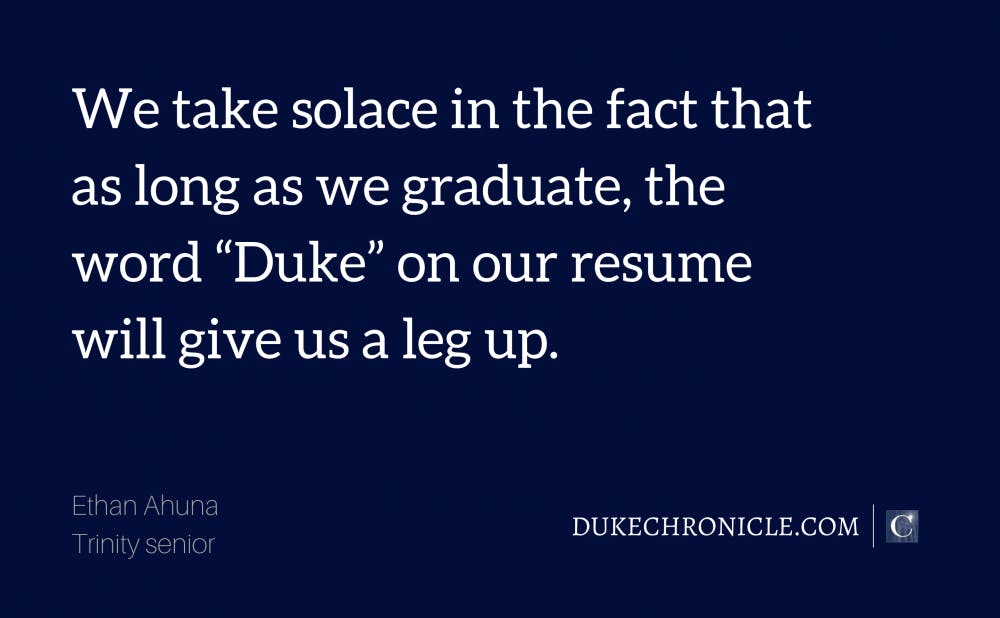I stumbled upon my first sociology class my freshman spring and was immediately smitten. I used to call my mom from the first floor of Perkins to gush about my readings, and to me, that was a sign that sociology was something I should pursue. So I decided to major in sociology because I liked it. And when you come to Duke, you should study something you like, right?
But when you major in something like sociology—or really, when you major in anything other than a natural science, engineering, computer science, public policy, or economics—people become intent on figuring out why. When someone tells me they are majoring in public policy, or biomedical engineering, or biology, I usually say something generic, like, “oh that’s cool!” When I admit to being a sociology major, I get hit with the timeless, dreaded question:
“So...what do you want to do with that?”
I think we have an idea that majors are somehow less rigorous—or at least less practical—when there is not a clear and prosperous career path that logically follows them. So you’re a biology or chemistry major? Great, you’ll be a scientist or a doctor. Studying econ? Are you thinking banking, or is financial consulting more your style? You’re a computer science major? To which tech companies are you applying this summer?
I know it’s unfair of me to assume that everyone in said majors wants to follow such prescribed paths, and I’m not here to major-shame anyone in a piece about my shamed major. But if you are one of those majors and do want to take that path, it’s there for you. There is a certain type of comfort in a program of study that can offer you a shiny pot of job security at the end of its rainbow.
As Duke students, we like to know that we will succeed. We are accepted to this school partly because we scored top marks in almost every high school class we took. At the end of each semester, we break out the calculators and figure out exactly what score we need on a final to get an A in the class. We take solace in the fact that as long as we graduate, the word “Duke” on our resume will give us a leg up. Most of us are scared by the great unknown, because in the great unknown we might not always come out on top. So when there’s no agreed-upon trajectory that follows someone’s bachelor’s degree, we tend to subconsciously or overtly ask why someone—given the immense pressure and lofty tuition costs of Duke—would take that risk without the virtual guarantee of real-world payoff.
But here’s why I love sociology: My roommate, a neuroscience major planning on medical school, told me that her medical sociology course was the most impactful class she’s taken at Duke. Instead of just memorizing facts or mastering procedures, she was forced to face the socioeconomic and race-based healthcare disparities that exist in the United States and consider how the medical system she plans to work in can perpetuate or resolve those disparities.
Because that’s the thing about an “impractical” major like mine: it might not give you concrete skills or abilities to succeed in a particular field, but it instills a mindset that teaches you to always look for questions: How does Hurricane Florence impact the Carolinas outside of college students getting a four-day weekend? What is the effect of the upscale off-campus apartment building where I live on the livelihoods of lower-income Durhamites who have been here for generations? It’s a mindset that has helped me become more intentional about the choices I make at Duke: Am I doing this just because it seems popular or impressive, or is this really what I want?
And it’s a critical view of the world that will serve me well in any workplace and any life situation that comes my way. If you give me jobs to do or skills to learn, I can figure out the job or master the skills if I put in the effort. But the spirit of questioning, the search for implications, and the reflective lens with which I’ve learned to view the world are not something a tutorial or a handbook could ever teach me.
I will graduate Duke with a completely different set of skills from those of many of my friends. My coding ability is limited to plotting a line graph on R. Two years after I took Neuroscience 101 to satisfy an NS requirement, I do not remember the names nor functions of the different parts of the brain. And I really, truly have no idea what “fluid mechanics” even means. I will probably not be working in medicine, tech, engineering, banking or consulting, but—contrary to Duke’s popular belief—that does not mean I cannot be equally successful. I studied something I thoroughly enjoy, and it taught me how to think about the world in a way that no job and no set of facts ever could.
So if anyone is looking to hire a graduating Duke senior with minimal technical skills but a lot of good questions to ask, please shoot me an email at eja14@duke.edu or add me on LinkedIn.
Ethan Ahuna is a Trinity senior. His column usually runs on alternate Tuesdays.
Get The Chronicle straight to your inbox
Signup for our weekly newsletter. Cancel at any time.

